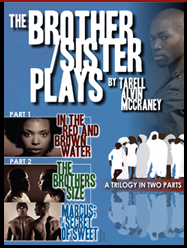
But one thing that I said was thankfully left on the editing room floor. When the interviewer (okay, it was Ilana Brownstein, who was one of my profs at BU,) said she knew I was a playwright and wondered, as a playwright, what did I think of the play (or something like that) I said, Oh, it makes you jealous. You wish you had thought f it. It just came out without thinking. And it came out so fast, there was no taking it back or denying that I was saying exactly how I felt. Right from the gut. In the moment.
Later, I thought, that was a pretty selfish and small thing to say, even it is true. What I should have said was, Oh, it inspires me to do great work. Or even, Mr. McCraney inspires me as a playwright by setting the bar high. Which, is all exactly true. I do think all that. After I think, shit, I wish I would have thought of that. Admit it, I'm just saying aloud what a lot of you other writers are thinking, too. Or maybe I am the only shit in the room; it wouldn't be the first time.
I mean, look how this play opens:
Mama Moja:
Mama Moja enters the space...
Where are you going Oya?
Oya:
Gotta go. Track meet.
Mama Moja:
No.
Oya:
No?
Mama Moja:
Moja looks at Oya like, "What I say?"
What I say?
Just the device of the actor speaking the stage directions is something so new, that lends itself so remarkably to that grand metaphor we call the theater (he gushed.) but then writing the lines in stanza form conveys so much about the words, too, which is also something new. What does it convey? It tells director and actors and dramaturgs and a whole bunch of people that this isn't just standard dialogue. The words must be treated differently. How they're treated differently, I think, is up to all the theatrical artists who are working on the production, but it's still so ground-breaking that, yes, it makes me jealous.
 RSS Feed
RSS Feed
